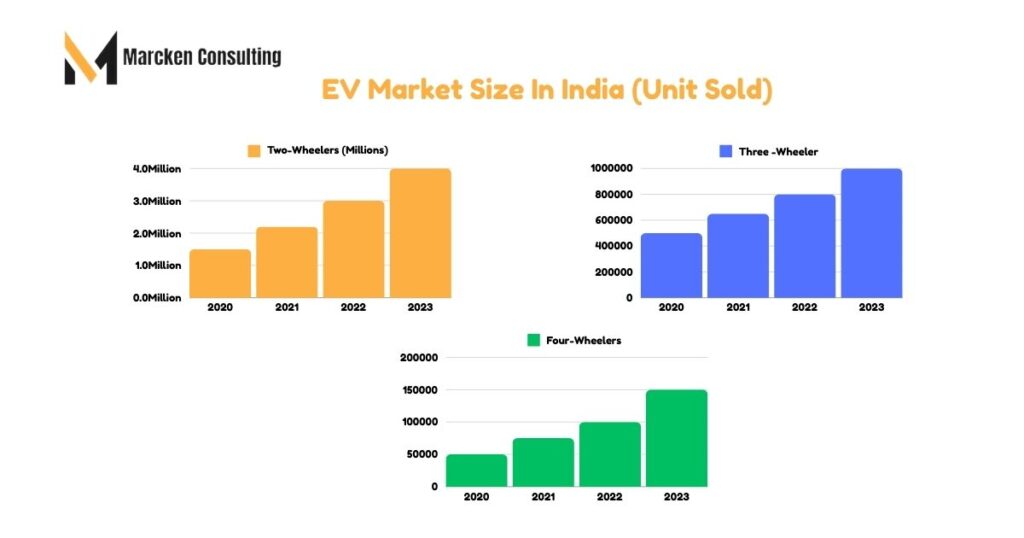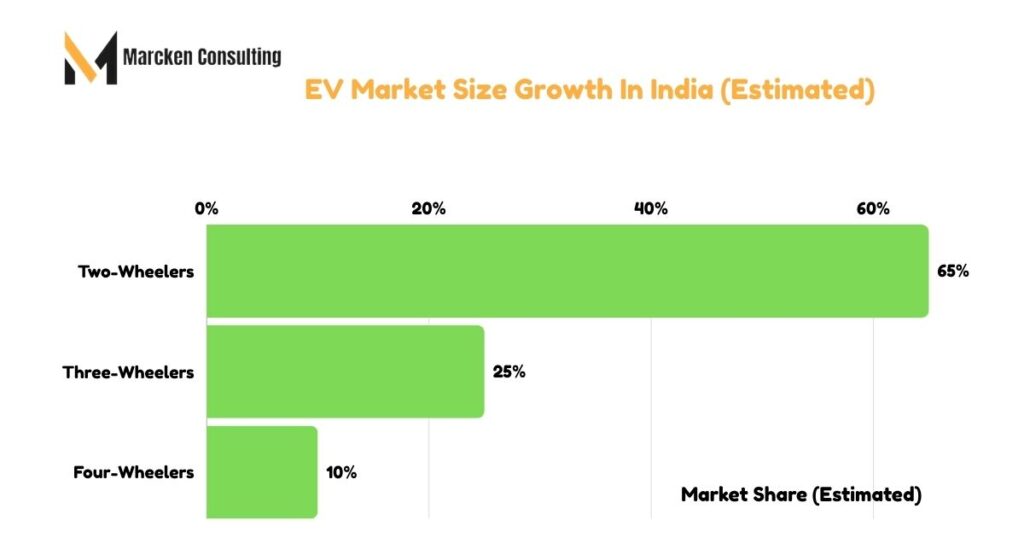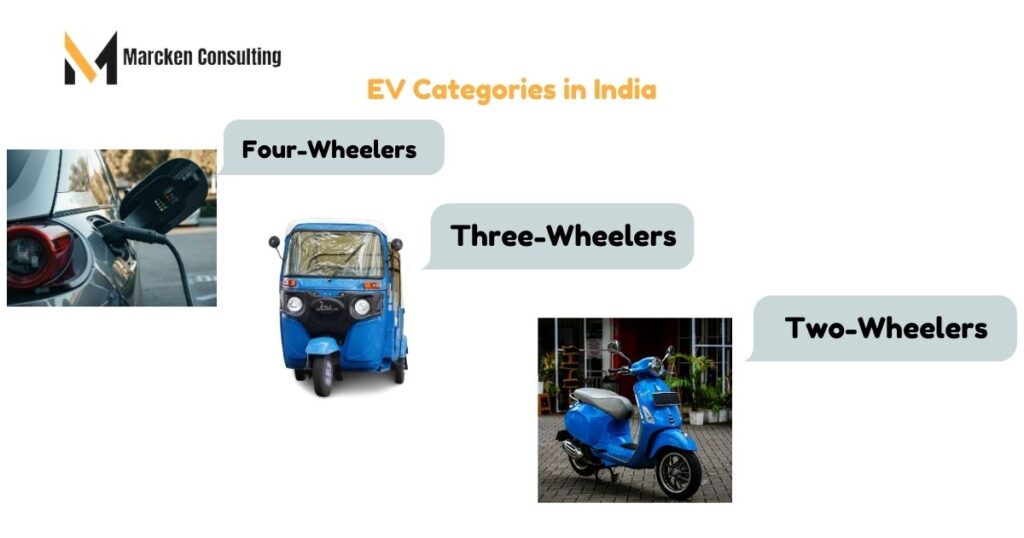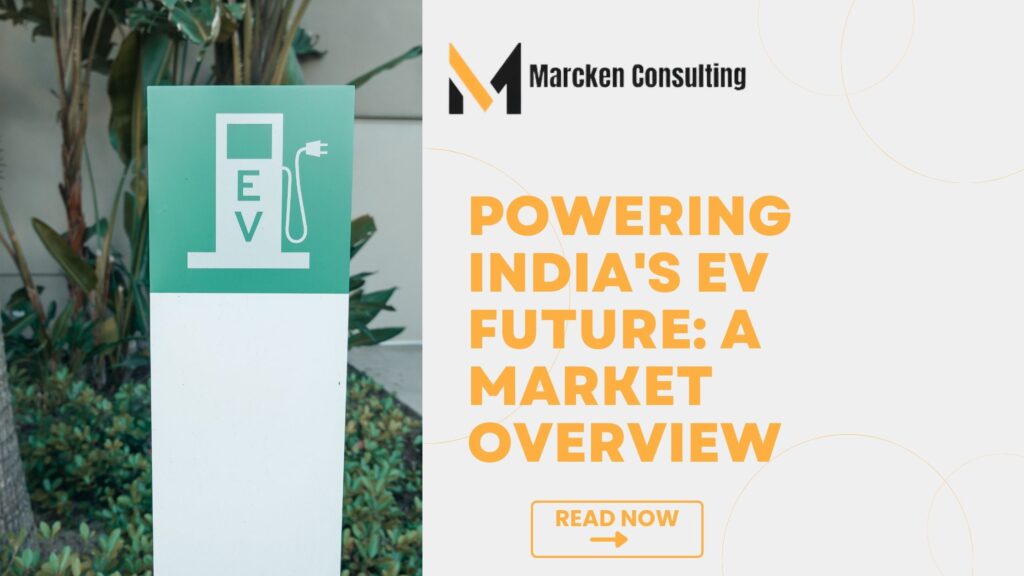India’s market for electric vehicles (EVs) is expanding quickly thanks to government programs, technical developments, and growing consumer awareness. As the world transitions towards sustainable transportation, India’s EV market presents a significant opportunity for growth and innovation.
In this blog, we will delve into the key aspects of India’s EV industry, including market size, categories, challenges, and growth opportunities. We aim to provide valuable insights for startups, investors, and policymakers looking to capitalize on this emerging sector.
We will also explore how Marcken Consulting can support EV startups in navigating the complexities of the Indian market and achieving sustainable success
Table of Contents
ToggleIndia's EV Market Size and Growth
India’s EV market has witnessed a significant surge in recent years, driven by government policies, technological advancements, and rising consumer awareness.
Current Market Size:

- While exact figures may vary slightly, India’s EV market has experienced substantial growth in recent years.
- The electric two-wheeler segment has seen the most rapid adoption, with millions of units sold annually.
- The electric three-wheeler market, primarily comprising auto-rickshaws, is also expanding steadily.
- The electric four-wheeler segment, although still relatively small compared to traditional vehicles, is gaining traction with the introduction of new models and incentives.
Growth Rate and Projections:
- India’s EV market is expected to continue growing at a rapid pace in the coming years.
- The government’s ambitious targets for EV adoption, coupled with technological advancements and improving infrastructure, are driving this growth.
- Industry experts predict significant increases in EV sales across all categories, with projections ranging from millions to tens of millions of units by 2030.
- CAGR (Compound Annual Growth Rate): 25-30% (estimated).
- Projected Growth: Continuing strong growth in the coming years, driven by government policies, technological advancements, and rising consumer demand.

Factors Driving EV Growth in India
- Government Incentives: The Indian government has introduced various incentives to promote the adoption of EVs, including subsidies, tax benefits, and preferential policies.
- Technological Advancements: Improvements in battery technology, charging infrastructure, and vehicle performance have made EVs more affordable, efficient, and convenient.
- Rising Fuel Prices: The increasing cost of fossil fuels is making EVs a more attractive option for consumers.
- Environmental Concerns: Growing awareness of climate change and air pollution is driving demand for cleaner and greener transportation options.
- Urbanization and Congestion: The rapid urbanization of Indian cities and increasing traffic congestion are creating a favorable environment for EVs, which offer a solution to pollution and traffic management challenges.
EV Categories in India
India’s EV market is characterized by a diverse range of categories, each with its unique characteristics and growth potential.
Two-Wheelers (e-Scooters, e-Bikes)
- Market Share: The two-wheeler segment dominates India’s EV market, accounting for the majority of sales.
- Growth Potential: This category is expected to continue its rapid growth, driven by factors such as affordability, convenience, and government incentives.
- Key Trends: An important development is the rising use of electric scooters, particularly in cities.
Three-Wheelers (Auto-Rickshaws)
- Market Share: Three-wheelers, particularly auto-rickshaws, form a substantial portion of India’s EV market.
- Growth Potential: This category is poised for significant growth, especially in cities with high traffic congestion and pollution concerns.
- Key Trends: The transition from traditional gasoline-powered auto-rickshaws to electric ones is gaining momentum.
Four-Wheelers (Cars, Buses)
- Market Share: While the four-wheeler segment is still relatively smaller compared to two-wheelers and three-wheelers, it is experiencing steady growth.
- Growth Potential: The introduction of new EV models, improved charging infrastructure, and government incentives are expected to drive growth in this category.
- Key Trends: The increasing availability of affordable electric cars and the development of electric buses for public transportation are notable trends.

Challenges Facing India's EV Industry
Despite its significant growth potential, India’s EV market faces several challenges that could hinder its development.
Infrastructure Limitations
- Charging Infrastructure: The availability of charging stations remains a crucial concern, particularly in rural areas and long-distance travel routes.
- Battery Swapping: While battery swapping can offer a faster charging solution, it requires a dedicated network of swapping stations and standardized battery packs.
Regulatory Hurdles and Policy Barriers
- Complex Regulations: The regulatory landscape for EVs in India can be complex, with varying policies and incentives at the national and state levels.
- Policy Uncertainty: Inconsistent policies and a lack of long-term clarity can create uncertainty for investors and manufacturers.
- Trade Barriers: Import duties and tariffs on EV components can increase costs and hinder market competitiveness.
Consumer Concerns and Adoption Challenges
- Range Anxiety: Consumers may be hesitant to adopt EVs due to concerns about their range and the availability of charging infrastructure.
- Initial Cost: The adoption of EVs may need to be improved by higher initial costs than conventional cars.
- Lack of Awareness: Many consumers may not be fully aware of the benefits and advantages of EVs, such as lower operating costs and reduced environmental impact.
Opportunities for Growth in India's EV Market
Despite the challenges, India’s EV market presents significant opportunities for growth and development.
Growth Potential in Different Segments
- Two-Wheelers: The two-wheeler segment offers immense potential, driven by factors such as affordability, convenience, and government incentives.
- Three-Wheelers: The commercial three-wheeler market, particularly auto-rickshaws, presents a significant opportunity for electrification, given the high number of vehicles in operation.
- Four-Wheelers: The passenger car segment is expected to witness substantial growth, driven by the introduction of new EV models, improved charging infrastructure, and consumer preferences for sustainable transportation.
- Public Transportation: The electrification of public transportation, such as buses, can contribute to reducing pollution and improving air quality in urban areas.
Role of Government Incentives and Policies
- Subsidies and Tax Benefits: Government incentives, such as subsidies and tax breaks, can significantly stimulate EV adoption.
- Infrastructure Development: Investments in charging infrastructure, battery swapping stations, and grid modernization are essential for supporting the growth of the EV market.
- Regulatory Framework: Clear and supportive regulatory frameworks can create a favorable environment for EV manufacturers, investors, and consumers.
Impact of Technological Advancements
- Battery Technology: Advancements in battery technology, including increased energy density and reduced costs, will play a crucial role in making EVs more affordable and practical.
- Charging Infrastructure: The development of faster and more efficient charging technologies will address range anxiety and encourage EV adoption.
- Autonomous Vehicles: The integration of autonomous driving technology with EVs can offer new opportunities for shared mobility and ride-hailing services.
International Collaborations and Investments
- Global Partnerships: Collaborations with international EV manufacturers, technology providers, and investors can accelerate the development of India’s EV ecosystem.
- Technology Transfer: Partnerships can facilitate the transfer of knowledge and technology, helping India become a global EV industry leader.
- Foreign Direct Investment: Attracting foreign direct investment (FDI) can provide the necessary capital and expertise to support the growth of India’s EV market.
How Marcken Consulting Can Help EV Startups
Marcken Consulting offers a comprehensive range of services to support the growth and success of EV startups in India. Our expertise lies in providing strategic guidance, financial modeling, valuation, and transaction advisory services tailored to the unique needs of the EV industry.
Here’s how our services can benefit your EV startup:
- Strategic Consulting: Our team of experienced consultants can help you develop a robust business plan, identify market opportunities, and navigate the complexities of the EV landscape.
- Financial Modeling: We specialize in creating accurate and comprehensive financial models that can assist in securing funding, evaluating investment opportunities, and making informed business decisions.
- Valuation Services: Our valuation experts can provide reliable valuations of your EV startup, which can be crucial for fundraising, mergers and acquisitions, and other corporate transactions.
- Transaction Advisory: We offer expert guidance on mergers, acquisitions, and other corporate transactions, ensuring a smooth and successful process.
- Pitch Deck Development: We can help you create compelling pitch decks that effectively communicate your startup’s vision, value proposition, and financial projections to potential investors.
- Mentorship and Guidance: Our team of experienced professionals can provide mentorship and guidance to help you overcome challenges and achieve your business goals.
Conclusion
India’s EV market is poised for significant growth, driven by government initiatives, technological advancements, and rising consumer awareness. While challenges such as infrastructure limitations and regulatory hurdles exist, the growth opportunities are substantial.
By addressing these challenges and capitalizing on the potential of different EV segments, India can position itself as a global leader in the electric vehicle revolution.
Marcken Consulting is committed to supporting EV startups in their journey to success. Our comprehensive range of services, including strategic consulting, financial modeling, valuation, and transaction advisory, can help you navigate the complexities of the Indian market and achieve your business goals.
Frequently Asked Questions
Q1. Which EV category is currently dominating the Indian market?
The two-wheeler segment, particularly electric scooters, dominates India’s EV market. However, the three-wheeler and four-wheeler segments are also experiencing significant growth.
Q2. What are the key trends in the Indian EV market?
Some of the key trends in India’s EV market include the increasing popularity of electric scooters, the growth of the commercial three-wheeler segment, the introduction of new EV models in the four-wheeler segment, and the development of electric buses for public transportation.
Q3. How can Marcken Consulting help EV startups in India?
Marcken Consulting offers a range of services to support EV startups, including strategic consulting, financial modeling, valuation, and transaction advisory. Our expertise can help startups develop business plans, secure funding, navigate regulatory hurdles, and achieve their growth objectives.


